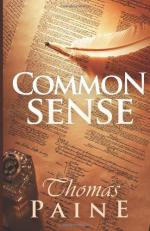The most plausible plea, which hath ever been offered in favour of hereditary succession, is, that it preserves a nation from civil wars; and were this true, it would be weighty; whereas, it is the most barefaced falsity ever imposed upon mankind. The whole history of England disowns the fact. Thirty kings and two minors have reigned in that distracted kingdom since the conquest, in which time there have been (including the Revolution) no less than eight civil wars and nineteen rebellions. Wherefore instead of making for peace, it makes against it, and destroys the very foundation it seems to stand on.
The contest for monarchy and succession, between the houses of York and Lancaster, laid England in a scene of blood for many years. Twelve pitched battles, besides skirmishes and sieges, were fought between Henry and Edward. Twice was Henry prisoner to Edward, who in his turn was prisoner to Henry. And so uncertain is the fate of war and the temper of a nation, when nothing but personal matters are the ground of a quarrel, that Henry was taken in triumph from a prison to a palace, and Edward obliged to fly from a palace to a foreign land; yet, as sudden transitions of temper are seldom lasting, Henry in his turn was driven from the throne, and Edward recalled to succeed him. The parliament always following the strongest side.
This contest began in the reign of Henry the Sixth, and was not entirely extinguished till Henry the Seventh, in whom the families were united. Including a period of 67 years, viz. from 1422 to 1489.
In short, monarchy and succession have laid (not this or that kingdom only) but the world in blood and ashes. ’Tis a form of government which the word of God bears testimony against, and blood will attend it.
If we inquire into the business of a king, we shall find that in some countries they have none; and after sauntering away their lives without pleasure to themselves or advantage to the nation, withdraw from the scene, and leave their successors to tread the same idle ground. In absolute monarchies the whole weight of business, civil and military, lies on the king; the children of Israel in their request for a king, urged this plea “that he may judge us, and go out before us and fight our battles.” But in countries where he is neither a judge nor a general, as in England, a man would be puzzled to know what is his business.
The nearer any government approaches to a republic the less business there is for a king. It is somewhat difficult to find a proper name for the government of England. Sir William Meredith calls it a republic; but in its present state it is unworthy of the name, because the corrupt influence of the crown, by having all the places in its disposal, hath so effectually swallowed up the power, and eaten out the virtue of the house of commons (the republican part in the constitution) that the government of England is nearly as monarchical




